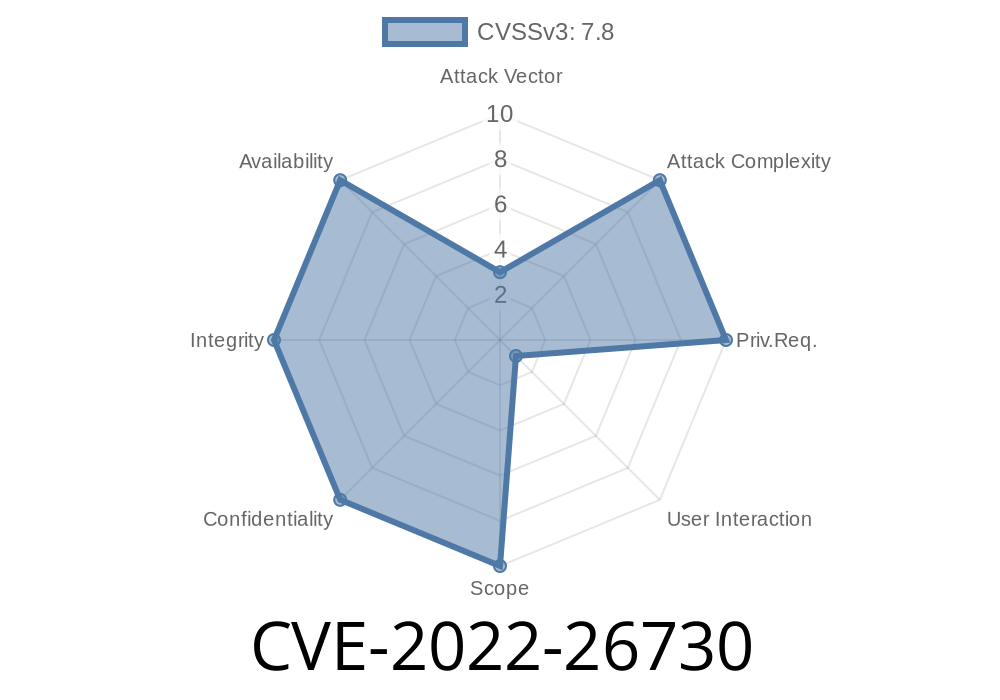---
What is CVE-2022-26730?
CVE-2022-26730 is a security vulnerability that was found in Apple’s macOS (specifically the way it handles ICC profiles in images). If a user opened a maliciously crafted image file, an attacker could potentially execute arbitrary code on the system—meaning they could run almost any program they wanted, from installing spyware to stealing files. This type of flaw is especially dangerous because images are sent and opened every day by almost everyone, from email to web browsing.
Apple fixed this issue in macOS Ventura 13, preventing the exploit from working in newer systems.
What Are ICC Profiles Anyway?
ICC profiles are data files embedded in images (like JPEGs or TIFFs) that help your computer understand how colors should look on different devices (like monitors, printers, or phones). Most of the time, this data is harmless and used to make pictures look right.
But in this case, there was a bug in the way macOS read ICC data—meaning that a specially crafted ICC profile could cause memory corruption and let an attacker run their own code.
Technical Breakdown
The core problem was insufficient input validation when parsing the ICC profile data from images. If the ICC data had been crafted in a certain way, it would mess up the memory management inside the image processing framework. This made it possible to overwrite important memory areas, including those that control which instructions get executed on your Mac.
Victim opens the image on an unpatched Mac (macOS before Ventura 13).
3. macOS image processing library reads the ICC profile, stumbles over the corrupted data, and mismanages memory.
Code Snippet: Simulating the Bug (for Illustration Only)
Here’s a highly simplified, illustrative Python snippet showing what can go wrong if you don’t check buffer sizes or input data when reading an ICC-like profile:
def process_icc_profile(data):
# Let's say the ICC profile should be at least 128 bytes
if len(data) < 128:
raise ValueError("ICC profile too short")
# Read the declared size from the first 4 bytes
declared_size = int.from_bytes(data[:4], "big")
# Vulnerable: doesn't check if declared_size is actually within the buffer
icc_data = data[4:4+declared_size]
# ... proceeding to use icc_data
print("Processing ICC profile of size:", len(icc_data))
# [Further processing]
An attacker can supply an image with a bogus ICC profile where the first 4 bytes (declared_size) are huge, causing a massive over-read or over-write in memory, eventually corrupting the process state. Proper validation would ensure declared_size is not bigger than the actual buffer.
Malformed (evil) ICC profiles are rejected, closing the loophole for hackers.
Reference:
- Apple Security Updates - June 2022
- CVE Details for CVE-2022-26730
Is There a Public Exploit?
As of now (June 2024), there is no public "weaponized" exploit available for download, but security researchers have confirmed that the vulnerability was real and dangerous. Apple’s advisories do not go into technical detail to help prevent the exploit from being copied in the wild.
The typical way an exploit would be built
- Create a JPEG image with a custom ICC profile whose internal structure triggers the memory corruption.
Host the file on a website or send as an email attachment.
- A user opens the file, and the ICC profile overflows memory in the macOS image library, jumping to attacker code.
What Should You Do?
- Update to macOS Ventura 13 (or later)! That’s the only way to ensure you’re protected from this flaw.
Further Reading
- Apple Security Updates
- The ICC Profile Format Specification
- Understanding Memory Corruption Vulnerabilities
> Stay safe—always keep your OS updated, and remember that even pictures can be dangerous!
Exclusive insight:
CVE-2022-26730 is a great example of how even tiny oversights in rarely-considered image data can lead to huge consequences. Behind every beautiful image, there might be a hidden danger—so don’t postpone those OS updates!
Timeline
Published on: 11/01/2022 20:15:00 UTC
Last modified on: 11/03/2022 13:15:00 UTC
